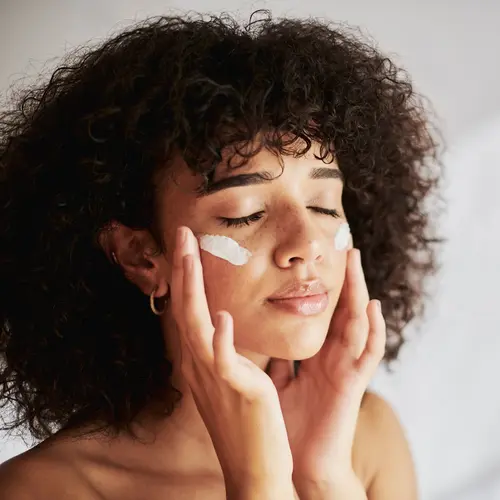Take a walk down any beauty aisle and you'll see labels boasting "natural," "organic," and "eco-friendly" ingredients. With more and more so-called "green" options on the market, you might wonder if these products are safer or offer more benefits than their traditional counterparts. Before you invest in these products, read what our experts have to say about whether going natural is better than the man-made alternatives.
"Anyone can use the term 'natural' on a product," says Manjula Jegasothy, MD, a dermatologist in Miami. "It should mean that the ingredients are derived from an organic source and not man-made, but it can be a broad marketing term."
The reason is that the FDA doesn't regulate terms like "natural" and "organic." "There's no standardized definition of the terms," says Joel Schlessinger, MD, a dermatologist in Omaha, NE. "Without regulation, there's no accepted percentage of ingredients that must be natural."
And which ingredients qualify as natural is also up for debate. "This argument really comes down to a case of what is considered 'natural' and what is not," says Randy Schueller, a cosmetics chemist in Chicago and co-founder of The Beauty Brains. "I think that everyone can agree that pomegranate extract is natural. But what about mineral oil? It's refined from petroleum that comes out of the earth. Is it any more or less natural?"
The guidelines about using "organic" on a label are clearer. The U.S. Department of Agriculture sets rules around the definition, and beauty products must follow the same production and handling standards as organic food. The USDA requires manufacturers to use approved methods that conserve the environment. Synthetic fertilizers, sewage sludge, irradiation, and genetic engineering may not be used. For a product to be labeled USDA 100% Organic, it must contain only organically produced ingredients, excluding water and salt. To carry a USDA Organic label, the product must contain at least 95% organically produced ingredients, again, excluding water and salt.
Determining how natural a product is requires a bit of research. Check where natural ingredients fall on the label. The first items listed appear in the highest concentration; the less there is of the ingredient, the later it's listed.
Making the determination as to whether natural products are better is an even more confusing task. "The preference for a product free of synthetic additives and unnecessary preservatives, or anything that could harm your metabolism, makes sense," Schlessinger says. "But sometimes the 'purest' products might not be the most effective."
Much of what consumers seek to avoid are preservatives like parabens and phthalates. The problem is that natural preservatives may not work as well, Schlessinger says. That means natural products tend to have a shorter shelf life. So buying natural may require you to pay closer attention to expiration dates and how you store your products.
Though it may seem counterintuitive, those with sensitive skin should be careful when selecting a natural product. "Having allergies to botanical or plant-derived skin care ingredients tends to be more common than reactions to synthetics," Jegasothy says.
She warns against fragrances derived from natural sources like lavender and jasmine because they have the potential to cause irritation, especially if you have seasonal allergies. Naturally derived ingredients like oats, green tea, sugar, manuka honey, argan oil, and coconut oil all offer benefits without needing lab processing, Jegasothy says.
"With natural and organic products, you may be sacrificing efficacy to satisfy someone's definition of the word 'natural,'" Schueller says. "You have to consider what the product claims to do, how well the formula will deliver against those claims, and how much the product costs."
Find more articles, browse back issues, and read the current issue of "WebMD Magazine."

